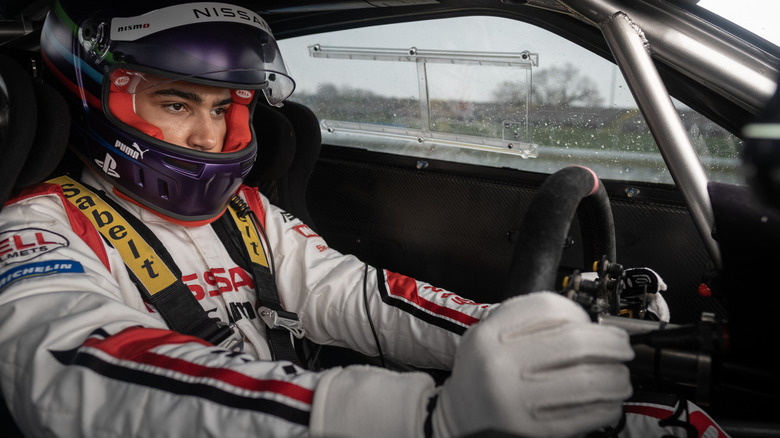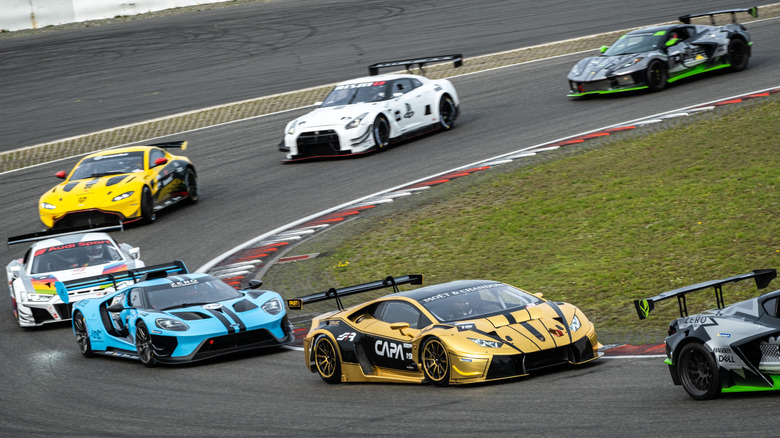Gran Turismo's Most Controversial Moment Is Based On A Tragic Real-Life Event
Warning: This article contains spoilers (and not the ones you find on cars) for "Gran Turismo."
In many ways, the most shocking thing about "Gran Turismo," the based-on-a-true-story sports drama/biopic of how Jann Mardenborough transformed from a gamer to a full-fledged racer, is the fact that such a grounded and straightforward film ended up with director Neill Blomkamp ("District 9," "Elysium," and "Chappie") behind the wheel. Competently directed and following much of the same formula as several other films in this genre have done before (you can check out my comprehensive review for /Film here), "Gran Turismo" wouldn't seem like the obvious choice to act as a lightning rod for potential controversy. An obsessive racing simulation gamer enters a competition, qualifies for GT Academy, and relies on the support of friends, family, peers, and his trainer to become an actual, professional driver. Simple enough, no?
Well, it is, aside from the inclusion of one particularly fraught moment in the life of the real Jann Mardenborough.
Played by Archie Madekwe in the film, Jann begins his racing career inauspiciously — a series of poor performances and even some DNF's (in racing parlance, "Did Not Finish") threaten to end this joint experiment by Nissan and PlayStation before it ever really gets off the ground. But, as portrayed in the film, a life-changing crash during the German-set race at the notoriously challenging Nürburgring track upends everything. When Jann's car goes airborne, it crashes into the stands and ends up killing a spectator while injuring several more. The film repurposes this traumatic event as the springboard to Jann rededicating himself to his passion and eventually placing third at the formidable 24 Hours of Le Mans race ... but that's not quite how it played out in real life.
Fact vs fiction
It's worth noting right from the start that the real Yann Mardenborough acted as a consultant and even a stunt driver for lead actor Archie Madekwe, where he explicitly gave permission and went so far as to push for his single most horrific public moment in his career to be depicted in "Gran Turismo." But the backlash and controversy stems less so from the crash itself, and more from how the film reframes these events as part of Jann's emotional character arc. Riding the line between fact and fiction in dramatizations of real-world events, as always, can prove tricky.
The liberties the film takes from the true story become clear with even cursory research. As covered extensively at the time, the 23-year-old's crash took place in 2015 — over four years after the racer had already graduated from GT Academy, as opposed to one of the earliest races he entered as depicted in "Gran Turismo." The fact that, in the movie, this horrific accident motivates the guilt-ridden Jann to overcome his own emotional turmoil and recommit himself to competing in the 24 Hours of Le Mans race isn't problematic in and of itself. But between the timeline rejiggering (in reality, Jann had already placed third at the momentous event two years prior) that misrepresents this event as one that vaulted the protagonist to greatness and the idea of a Sony-produced film essentially hand-waving a spectator's death — one who is never given any actual screen time in the film, nor their family — caused by a driver sponsored by a Sony-owned company (PlayStation) can't help but feel somewhat pernicious.
Ultimately, moviegoers will have the final say on "Gran Turismo" (early indications weren't promising), which is now racing into theaters.

